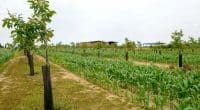Hosted by Kenya, the first African Climate Action Summit takes place from 4 to 6 September 2023 in the capital Nairobi. As well as harmonising solutions and expectations to better tackle the problems of climate change on the continent, the summit organisers are announcing the signing of several nature-based agreements. Also known as nature debt, these agreements enable developing countries to benefit from a reduction in their foreign debt in return for investments in biodiversity.
The African continent holds its first Climate Action Summit. More than 20 African heads of state and government and nearly 20,000 delegates from all over the world, including Antonio Guterres, the Secretary-General of the United Nations (UN), have confirmed their attendance at the summit from 4 to 6 September in Nairobi, the Kenyan capital.
According to the organisers, agreements worth several hundred million dollars are expected to be signed at the summit, including a new model for climate finance that is gradually taking shape in Africa. This involves financing based on the debt-for-nature mechanism. “We anticipate agreements ranging from one million dollars to hundreds of millions of dollars. These agreements would involve private and public financing for nature-based investments, clean energy production and climate adaptation efforts”, says Joseph Ng’ang’a, head of the secretariat of the African Climate Summit.
Read also-AFRICA: AfDB report assesses feasibility of debt-for-nature/climate swaps
The debt-for-nature mechanism has been expanding in Africa for some time. In June 2023, Portugal announced that it would swap $153 million of Cape Verde’s debt for investments in nature. At the beginning of August 2023, Gabon concluded its own agreement, worth 450 million dollars with the Bank of America (BofA), for the protection of part of its marine ecosystem. This is the second operation of its kind on the continent, after the Seychelles.
The debt-for-nature swap is often presented as a technique for relieving the debt of developing countries. It involves extending payment terms, reducing interest rates, granting new loans at lower rates than conventional and even cancelling debts. This technique, invented by the American biologist Thomas Lovejoy, considered to be the godfather of biodiversity, ultimately consists of exchanging part of the foreign debt for local investments aimed at protecting the environment.
Boris Ngounou







